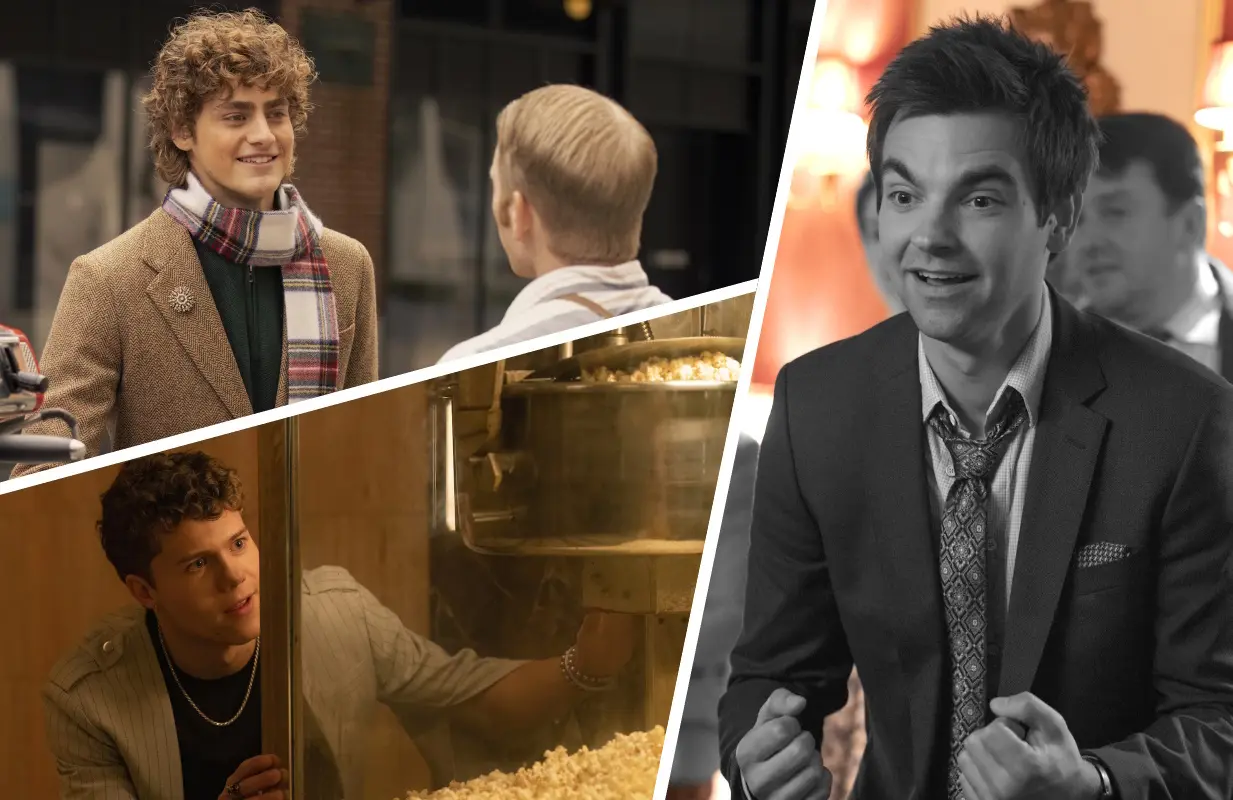The Other Two Does Pop Culture References Better Than Any Show on TV
-
 Fin Argus, Case Walker, and Drew Tarver on The Other Two (Photo: HBO)
Fin Argus, Case Walker, and Drew Tarver on The Other Two (Photo: HBO)More than any other show currently on television, The Other Two has mastered the art of pop culture references. They're neither cheap nor obvious, and they're laser-targeted to the show's audience. For a show about how fame and the entertainment industry can warp reality, The Other Two's advanced-level pop literacy easily convinces its culture-drenched audience that they're speaking the same deranged language. In the show's third season, creators and writers Chris Kelly and Sarah Schneider — along with a writing staff that this season has included Allison Silverman, Gil Nissim, Jimmy Fowlie, Moss Perricone, and Dylan Guerra — have crafted some of the show's most ambitious pop references to date, and they're nailing them.
The Other Two's audience isn't exclusively queer, but the show wears its queer sensibility boldly and expects that whatever audience it attracts will be able to keep up. The show's most recent episode, "Brooke, and We Are Not Joking, Goes to Space" (written by Nissim), sees Cary (Drew Tarver) get a voice role in the new Disney animated movie as Disney's "first unapologetically queer character." It's a notion that's immediately familiar to the show's queer, media-literate audience, who have been through the wringer of press cycle after press cycle where major studios have touted "exclusively gay moments" or landmark queer characters, only to be handed fleeting, amorphous, patronizing crumbs.
This is reflected in Cary's character, Globby, a "proud, queer sac of mucous" in Disney's Haunted Buddies (an instantly recognizable Hotel Transylvania knockoff). Cary's willingness to sell the ridiculous notion of Globby as an important step for queer rights illustrates just how far he's tumbled down the rabbit hole of the queer attention economy. Everything about this storyline, which The Other Two depicts with the utmost absurdity, is cringe-inducingly familiar to anyone who's spent even a little time paying attention to queer issues in media.
The queer celebrity industrial complex has been a hallmark of the show from the beginning, in ways big and small. Cary's initial brush with the hype cycle of gay notoriety came after his brother Chase (Case Walker) had a hit with "My Brother's Gay" in the show's fourth episode. From gay insta-couples to queer-baiting straight celebs, The Other Two has depicted this particular niche of queer culture that feels incredibly relatable to an audience that's immersed in its own corner of pop culture while simultaneously being a little bit repulsed by it. It's a fine line, and Kelly and Schneider have walked it perfectly.
Season 3 has gotten even more ambitious with its references as the show has taken a more elastic approach to reality. Cary's new boyfriend Lucas (Fin Argus) is an actor who's taken an extreme approach to method acting, inhabiting his part in a Love, Simon/Love, Victor knockoff where he's playing the kind of angel-faced, scarf-wearing, completely sexless gay teen who is instantly recognizable to queer audiences starved for representation. (He's later cast in a movie, Christmas But With Gay People, as a gay guy who's closeted to his family around the holidays.) Later in the season, Lucas is cast in a Broadway play, 8 Gay Men With AIDS: A Poem in Many Hours, which will give you PTSD flashbacks to that theater season where everybody you know was arguing about The Inheritance.
Whether it's remembering how important Justin Timberlake's Rolling Stone cover was to horny gay teens or casting the absolutely perfect gay-famous-at-the-moment actor for a cameo (Lukas Gage, naturally) or joking about everybody at Ellen's birthday party being relieved that she's not attending, The Other Two does "if you know, you know" pop culture humor at a level other shows just don't approach.
It's not just explicitly queer jokes either, though there's an argument to be made that the deep degree of familiarity that is assumed by Season 3's highly specific parodies of Pleasantville and William Shakespeare's Romeo + Juliet is spiritually queer. Cary's gig on a network procedural Emily Overruled becomes an episode-long, fiercely committed, note-perfect parody of the 1998 film Pleasantville, where Cary takes the Tobey Maguire role and teaches these regimented, clock-punching, black-and-white actors the technicolor joys of improvisation and indulging their actorly bullsh*t as their birthright. In the episode with the gay play, Chase’s meet-cute with an ordinary girl is depicted as a breathtaking recreation of the Romeo + Juliet fish tank scene.
These more formally ambitious parodies display a level of confidence that The Other Two has absolutely earned. It's the confidence of a writing staff that is locked in on their audience and are speaking from the same set of cultural experiences. It's the confidence of a show that, in its premiere episode, dropped a line about Survivor being "violently straight," yet now features Cary's queer friends gathering to watch Australian Survivor, accurately noting that in the ensuing four years, Survivor has become canonically queer entertainment. It's the confidence of a show that can make a joke about HBO Max (well, that's what it was called when the season filmed, at least) being incredibly glitchy. Because the platform is glitchy, and Kelly and Schneider know that we know it. For those of us inhabiting this silly, strange, deeply specific niche, The Other Two makes fun of it better than anyone.
New episodes of The Other Two premiere every Thursday on Max. Join the discussion about the show in our forums.
Joe Reid is the senior writer at Primetimer and co-host of the This Had Oscar Buzz podcast. His work has appeared in Decider, NPR, HuffPost, The Atlantic, Slate, Polygon, Vanity Fair, Vulture, The A.V. Club and more.
TOPICS: The Other Two, HBO Max, Case Walker, Chris Kelly, Drew Tarver, Sarah Schneider